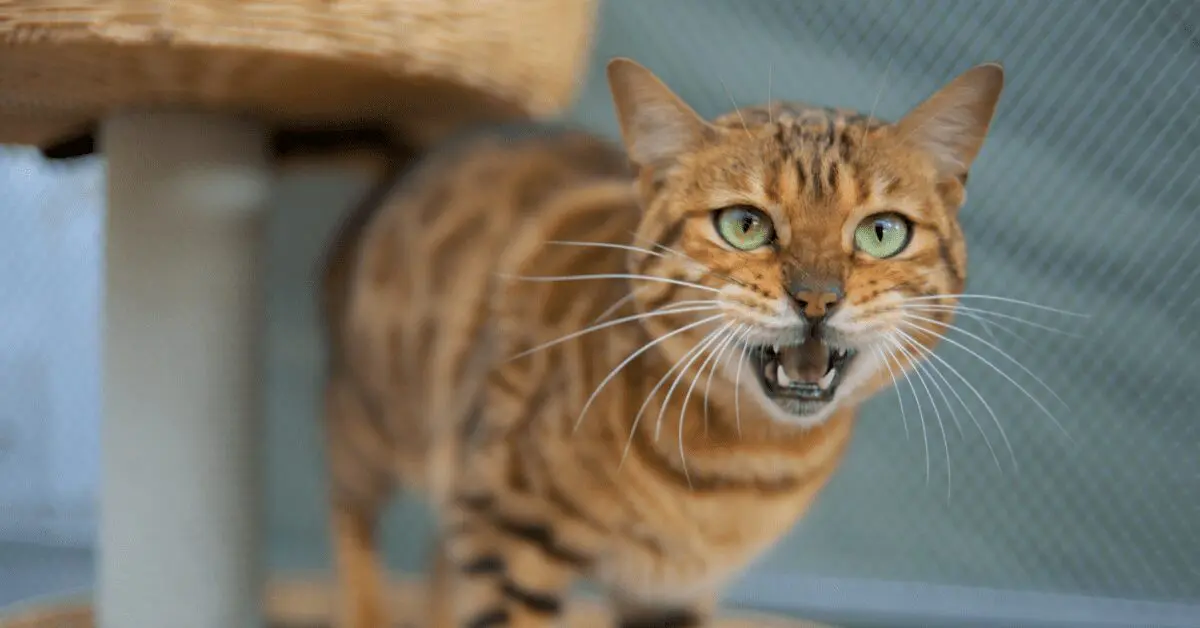Key Points
- A cat yowls to communicate pain, distress, fear, loneliness, boredom, or discomfort.
- Elderly cats who yowl may be displaying signs of confusion and dementia.
- In the absence of medical conditions, a yowl can be an attention-seeking behavior.
- Cats normally yowl during mating season, kitten play, or territorial marking.
As a pet parent, you know your cat companion’s range of usual vocalizations – from the soft, contented belly rub purring and the anticipatory trill before pouncing on a toy mouse, to the exasperated morning wake-up cries for breakfast and the understandably angry “yowch, you stepped on my tail!” But few forms of cat communication are as unnerving as yowling.
What does cat yowling sound like?
As Patrik Holmboe of Cooper Pet Care explains, “A ‘yowl’ is a loud, distinctive, drawn-out vocalization that cats make. Unlike meows, purrs, or even growls, a yowl sounds guttural and distressed.”
Like a growl, “a yowl’s pitch can also change, occasionally starting low and increasing or vice versa,” adds Dr. Alex Schechter (DVM) of Burrwood Veterinary Hospital. But unlike with an angry growl, the yowling tone tends to sound uncomfortable, sad, fearful, or stressed – as though your cat is wailing in pain.
Cats are typically stoic animals that hide their pain, so if your fur baby is vocalizing excessively and yowling, they’re likely trying to communicate something they feel is very urgent. The underlying cause isn’t always obvious, so you may need to speak with a professional who can translate the mysterious feline symptom into plain English.
Reasons for cat yowling
According to Chris Burston at Caredicat.com, surveys and studies conducted by the veterinary community have determined common five reasons for cat yowling:
Attention seeking
Cats naturally crave affection, play, and stimulation. Certain cat breeds (like Siamese, Bengals, Maine Coons, Russian Blues, Burmese, and Oriental Shorthairs) are known to yowl on purpose to capture their humans’ undivided attention. Attention yowls are often repeated over and over again until the desired action is performed – be it filling their food bowl with tuna fish at mealtime or lavishing them with a full-body massage.
Medical issues
Of course, if the yowl causes a knot in the pit of your stomach, listen to your gut! Excessive vocalization is best evaluated by a veterinarian to rule out underlying medical conditions that require treatment, as yowling cases has been linked to:
- Arthritis joint pain
- Chronic pain
- Cognitive dysfunction, decline, or dementia
- Deafness
- Dental pain
- Fever
- Fracture or traumatic injury
- Gastrointestinal bloating or cramping
- Hormonal imbalances like hypothyroidism or overactive thyroid
- Kidney disease
- Neurological conditions like headaches
- Urinary tract infections
“It’s important to note that any medical condition that causes a significant amount of pain can be responsible for yowling,” explains Dr. Thomas Doyne (DVM MS) of CutePetCare.com. “Yowling can be a natural response in the same way a human would cry if they experience pain or discomfort.”
Territorial behavior
In multi-cat households, yowling can indicate territorial disputes, particularly when accompanied by aggressive hissing, puffing up, fighting, or urinary marking. These behavioral problems often coincide with the introduction of a new person or animal. Younger cats yowl during playtime as they flex their vocal cords and work out the pack hierarchy.
Mating behavior
Female cats who are in heat often yowl loudly and incessantly to attract mates, while male cats yowl to advertise their availability and receptiveness to the female’s offer. “Females in heat can make extremely loud and intense yowls – to the point where it’s often mistaken for horrible pain,” says Dr. Holcombe. “It’s not uncommon for people to bring in female cats thinking they’re injured, when in fact they’re only in heat.” Along with your cat’s grand meow and yowl serenade, you’ll likely notice pacing, rolling on the ground, rubbing up against chairs, and scratching at the door to get out.
Environmental changes
Like any animal, our feline friends thrive on familiarity. A sudden new piece of furniture, home renovation, change in schedule, or loud noises like fire alarms can throw our proud little lions into a tailspin and cause yowls of fear, confusion, anxiety, uncertainty, or distress.
Getting to the bottom of your cat’s yowling
When you bring a cat to the veterinarian for yowling, they will typically:
- Consider the cat’s age, breed, medical history, and present symptoms
- Ask you a few questions about recent changes in the cat’s behavior or situation
- Run diagnostic tests such as bloodwork, urinalysis, or X-rays to look for a medical cause
Common questions a vet may ask about your cat’s yowling behavior include:
- How often does your cat yowl, and for how long?
- At what time of day does your cat yowl?
- Do you notice any other odd behaviors before, during, or after the yowling?
- Are there any other animals in the home? Has someone new come into your cat’s life?
- Has your cat been spayed or neutered?
Dr. Chyrle Bonk (DVM), a remote veterinary consultant at Petkeen.com, says she has seen cases where the cat was yowling to let the owner know “something isn’t right.” Cats can have end-stage kidney disease without serious pain, though nausea and weakness may cause the cat to communicate that they feel somewhat unwell. “Along with yowling, there was also weight loss, increased water consumption, and bad breath that led me to run bloodwork and ultimately diagnose kidney disease,” she explained.
Dr. Doyne recalls a time where a yowling cat seemed fine during the routine physical examination, but an X-ray revealed a small leg bone fracture: “We administered painkillers and a small splint to immobilize the leg to ensure a healthy recovery and had no further issues. By the check-up a few weeks later, the cat had stopped yowling and was recovering quickly.”
When no medical cause can be identified, your veterinarian may refer your cat to a behavioral specialist. Middle of the night yowling, in particular, may signal behavioral causes, says Dr. Holmboe.
Treatment
Specific treatment will depend upon your cat’s underlying medical or behavioral issue. Cats may need medication to recover from an ailment, or they may need extra TLC to soothe anxiety.
“Clinical history is important,” says Pet Keen veterinarian Paola Cuevas Moreno (MVZ). “I had a 13-year-old cat who started yowling at night. After running tests to rule out disease and arthritis, we determined this old cat was starting to experience senile cognitive dysfunction – or cat dementia. The cat was getting lost in their own house and became distressed.” In this case, something as simple as installing a nightlight or arranging a safe space where the food, bed, and litter box are in close proximity can have an impact.
Dr. Jamie Whittenburg, veterinarian director at Cat World, found a different diagnosis for an elderly cat she had seen. She recalls, “I was presented with a cat that was yowling at home during the nighttime hours. The cat was exclusively an indoor cat, 14 years old, and had previously always been in good health. She was eating, drinking, and using the litter box normally. A thorough physical exam did not reveal the problem, but a blood panel revealed that the cat was suffering from hyperthyroidism. Her owners opted for radioactive iodine (I131) treatment and she should be feeling better soon!”
In some cases, yowling can be an acute emergency situation, as vet tech Lindsay Warren of From Four Legs To Two has found. “The most common reason I’ve run into a cat being actively vocal with no obvious injuries is because they couldn’t urinate,” she says. “This problem is common in male cats, but not impossible in females as well. Male cats have a small urethra, making it easy for crystals or urinary stones to block. Most veterinary professionals can identify a cat that can’t pee just by its yowl.” She tells owners to isolate the cat in a small room with a clean litter box and watch to see if they attempt to use it. Usually they will use it pretty quickly – but if they’re blocked, they will have little to no urine, which may require urinalysis to confirm the diagnosis. This may be followed by treatment with a urinary catheter, antibiotics, or even surgery to save the cat’s life.
If your cat is yowling while in heat, the fix is rather simple: have your cat spayed. Beyond stopping the yowling and preventing unwanted pregnancy, spaying your cat can help prevent uterine infections, decrease the likelihood of breast or testicular cancer, and reduce unwanted behaviors like roaming, marking, or aggression.
Soothing a yowling cat
“Yowling can certainly be learned behavior,” observes Joey Lusvardi, a behavioral trainer with Class Act Cats in Minneapolis, MN. Your cat may try different styles of vocalization until they find one that succeeds in getting your attention.
In this case, the solution is two-fold, says Lusvardi: “First, don’t encourage the behavior by reinforcing it. A lot of people will try feeding their cat or giving them attention in response, which only increases the likelihood of it happening. It’s better to avoid responding as best you can, keeping in mind that the cat may go through something called an extinction burst where the behavior temporarily gets worse before it gets better. The yowling will subside with time once your cat sees it’s no longer working.”
“More importantly, consider how you can fulfill your cat’s needs ahead of time,” he adds. “For example, if your cat is yowling due to boredom, two or three play sessions of 10-15 minutes spread throughout the day can be very helpful. If they’re waking you up at night to eat, feeding them before bed or using an automatic feeder is a great solution as it removes you from the equation entirely.”
FAQs
Why is my cat yowling so much when they’re in the litter box?
First, take a look in the box to determine: is the litter box dirty? Some cats will complain rather loudly if their toilet is not to their liking. If the box is clean and your cat has never yowled when using the bathroom, this could be a sign of a urinary tract infection, bladder inflammation, urinary crystals, or constipation.
Why does my cat yowl when she eats?
Listen carefully: is your cat really yowling, or could it be a loud, low meow? Cats love mealtime! Sometimes a request for seconds can sound like a desperate yowl. Other times, a painful tooth, kidney disease, bloat, hyperthyroidism, or gastritis could be to blame.
Why does my cat walk around the house yowling?
When cats aren’t feeling well, they may pace around the house and yowl to indicate something is wrong and seek comfort. Illnesses like hyperthyroidism can cause a cat to feel restless, irritable, and thirsty – prompting them to wander the house yowling. In some cases, it’s an attention-seeking behavior that may be alleviated with more playtime during the day.
What should I do if my cat yowls all the time?
The best option for a cat who yowls persistently is to see your veterinarian for bloodwork, X-rays, urinalysis, and lifestyle counseling. When your cat needs diagnostics or medication to treat eligible conditions, Pumpkin can help you say “yes” to the best care.
Did you know?
- Cats may yowl when introduced to a new place, as if to say, “I want to go home.”
- Elderly cats can yowl due to confusion and early signs of dementia.
- Rarely do adult cats meow at one another, but they will yowl during mating or disputes!




